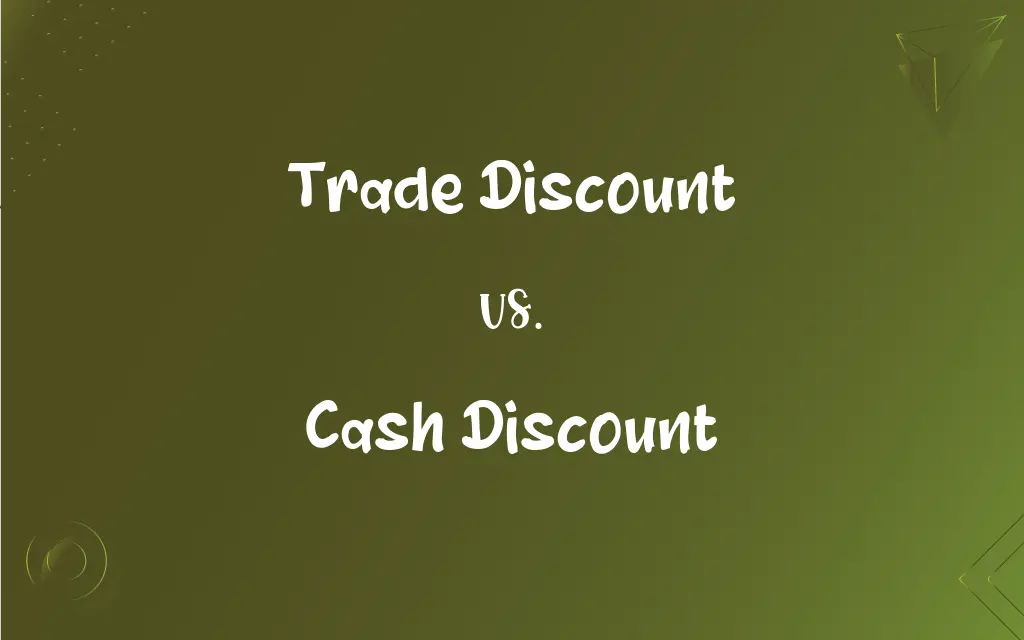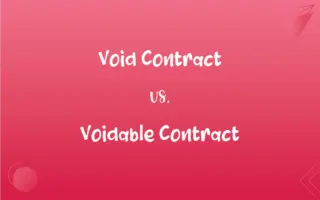Trade Discount vs. Cash Discount: What's the Difference?
Edited by Aimie Carlson || By Harlon Moss || Updated on October 13, 2023
A trade discount reduces the list price for resellers, while a cash discount incentivizes prompt payment by buyers.

Key Differences
A trade discount is a reduction in the list price of products or services, generally offered to resellers like wholesalers, retailers, or those in a specific trade. This reduction aims to increase sales volume or establish stronger business relationships. Conversely, a cash discount is an incentive provided to buyers to encourage them to make payments within a specified timeframe, often to accelerate cash flow for the seller.
Trade discounts are prevalent in industries with distribution channels involving intermediaries. They enable the intermediary, such as a retailer, to mark up the product for resale while still achieving a profit. In contrast, cash discounts are typically found in credit transactions, helping businesses collect their receivables quickly and reduce the risk of bad debts.
A key aspect of trade discounts is that they are not recorded in the accounting books as a separate transaction. Instead, they're directly subtracted from the list price. Cash discounts, however, can affect the financial statements since they relate directly to the payment terms and can influence the revenue realized from a sale.
The purpose behind offering a trade discount can vary, from aiming to strengthen brand loyalty to trying to offload excess inventory. On the other hand, the goal of offering a cash discount is typically singular: to ensure faster payment and thus improve cash flow.
While both trade discounts and cash discounts serve as tools to incentivize certain behaviors in commerce, they target different stages of the transaction process. A trade discount focuses on the purchase phase, aiming to boost sales volume, while a cash discount focuses on the payment phase, emphasizing prompt settlement of accounts.
ADVERTISEMENT
Comparison Chart
Purpose
To encourage bulk purchases or loyalty
To incentivize prompt payment
Target Audience
Resellers like wholesalers or retailers
Buyers or customers
Accounting Impact
Not recorded as a separate transaction
Can affect financial statements
Stage of Focus
Purchase phase
Payment phase
Common Occurrence
Industries with distribution channels
Credit transactions
ADVERTISEMENT
Trade Discount and Cash Discount Definitions
Trade Discount
A deduction given to those in a specific trade.
Being in the electronics business, they availed a trade discount.
Cash Discount
An incentive to accelerate cash flow for sellers.
The supplier offers a cash discount to receive payments faster.
Trade Discount
A reduction in list price given to resellers.
The manufacturer provided a 20% trade discount to the retailer.
Cash Discount
A tool to reduce the risk of bad debts.
By offering a cash discount, they minimized late payments.
Trade Discount
An incentive to encourage bulk purchases.
Due to the large order, we received a significant trade discount.
Cash Discount
A discount for prompt payment of an invoice.
If we pay within 10 days, we'll receive a 2% cash discount.
Trade Discount
A tool to boost sales volume.
To increase sales, the company introduced a new trade discount scheme.
Cash Discount
A deduction from the total amount if paid within a certain period.
There's a 5% cash discount if the bill is settled within a week.
Trade Discount
A discount that does not affect accounting records.
Though we received a trade discount, it wasn't reflected in the invoice.
Cash Discount
A discount impacting financial statements.
The company's revenue was affected by the high rate of cash discounts taken by customers.
FAQs
What is a trade discount?
A trade discount is a reduction in the list price offered to resellers or those in a specific trade.
Can a consumer avail a trade discount?
Typically, trade discounts are meant for resellers, not end consumers.
Is a trade discount recorded in the books?
No, trade discounts are directly deducted from the list price and not recorded as a separate transaction.
Why are cash discounts offered?
Cash discounts are offered to accelerate cash flow and reduce the risk of bad debts.
Can a business offer both trade and cash discounts?
Yes, a business can offer a trade discount for purchase volume and a cash discount for prompt payment.
What happens if a buyer misses the cash discount period?
If missed, the buyer must pay the full invoice amount without the cash discount.
Why might a business offer a trade discount?
Trade discounts can boost sales volume, strengthen loyalty, or offload excess inventory.
Do all suppliers offer trade discounts?
Not all suppliers offer trade discounts; it varies based on industry, competition, and business strategy.
What's the primary benefit of a trade discount to a retailer?
Trade discounts allow retailers to mark up products for resale and still achieve a profit.
Are trade discounts available in all industries?
Trade discounts are most common in industries with intermediaries like wholesalers or retailers.
How is a cash discount calculated?
A cash discount is a percentage of the invoice amount taken off if payment is made within a specified period.
Is a cash discount beneficial for the buyer?
Yes, cash discounts allow the buyer to pay less than the full invoice amount.
How are trade discounts presented on invoices?
Trade discounts are usually subtracted from the list price, so the invoice reflects the net price after the discount.
Are cash discounts available for all types of purchases?
Cash discounts are mainly associated with credit transactions to encourage early payment.
Are cash discounts mandatory to take?
No, cash discounts are optional, but they offer financial benefits to buyers who pay early.
How do cash discounts affect sellers' cash flow?
Cash discounts can improve sellers' cash flow by ensuring faster collection of receivables.
Can end consumers negotiate for trade discounts?
Generally, trade discounts are designed for intermediaries, not end consumers, so they're not typically negotiable for the latter.
How does a cash discount differ from a trade discount?
A cash discount incentivizes prompt payment, while a trade discount encourages bulk purchases or loyalty.
Can you negotiate a cash discount?
While cash discount terms are often standardized, in some cases, they might be negotiable based on the buyer-seller relationship.
Is a trade discount the same across all resellers?
No, trade discounts can vary based on order volume, reseller type, or the relationship with the supplier.
About Author
Written by
Harlon MossHarlon is a seasoned quality moderator and accomplished content writer for Difference Wiki. An alumnus of the prestigious University of California, he earned his degree in Computer Science. Leveraging his academic background, Harlon brings a meticulous and informed perspective to his work, ensuring content accuracy and excellence.
Edited by
Aimie CarlsonAimie Carlson, holding a master's degree in English literature, is a fervent English language enthusiast. She lends her writing talents to Difference Wiki, a prominent website that specializes in comparisons, offering readers insightful analyses that both captivate and inform.































































